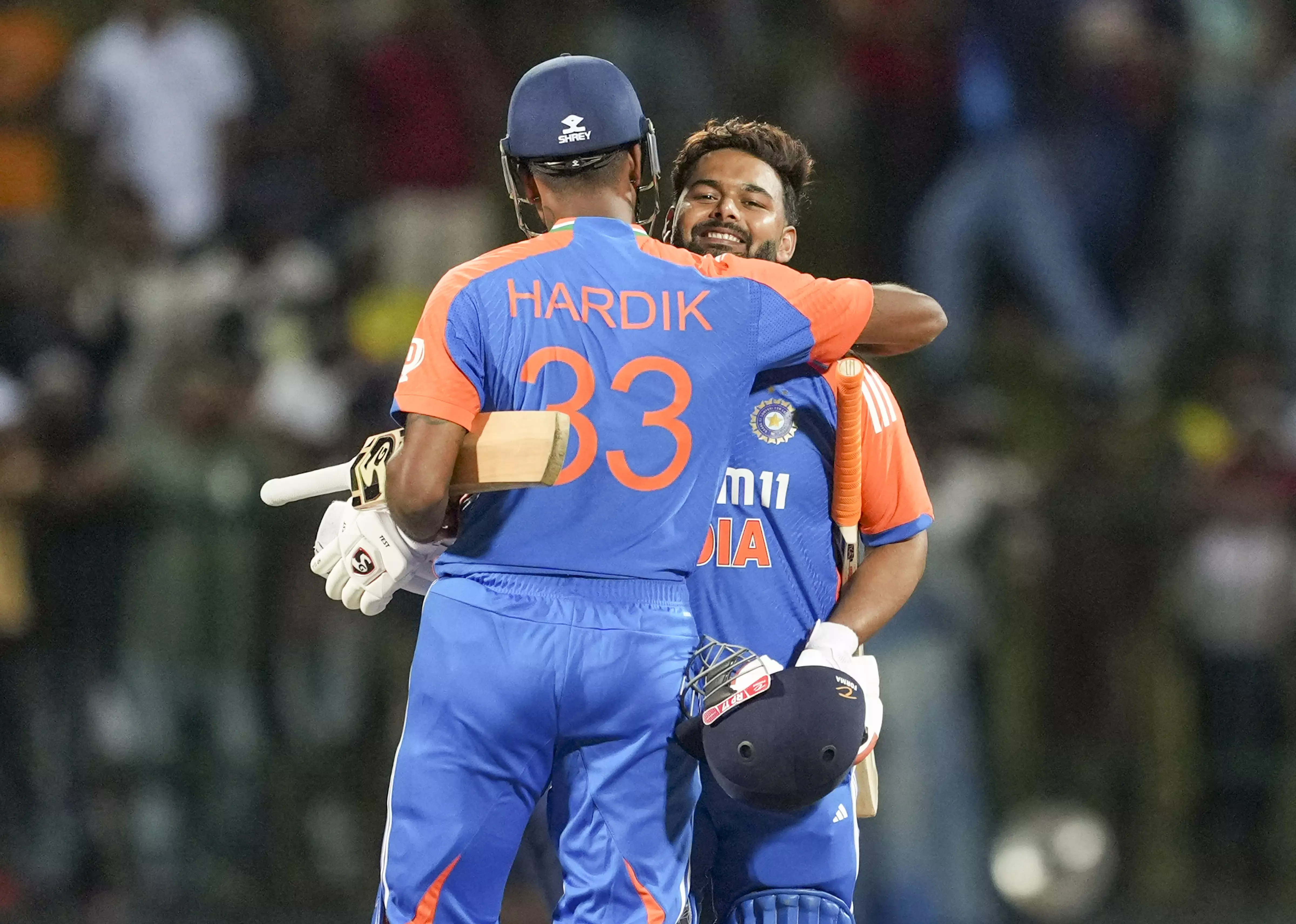
Hardik Pandya and Rishabh Pant celebrate after taking India home in the second T20 international cricket match against Sri Lanka at Pallekele on July 28. Photo: PTI
India beat Sri Lanka by 7 wickets in rain-hit match, win T20I series 2-0
Chasing a revised target of 78 in eight overs, skipper Suryakumar Yadav (26, 12b) and Yashasvi Jaiswal (30, 15b) batted well as India romped home in 6.3 overs

Yashasvi Jaiswal and skipper Suryakumar Yadav displayed their wide array of strokes as India took an unassailable 2-0 lead, winning the rain-curtailed second T20I by seven wickets with nine balls to spare at Pallekele on Sunday (July 28).
Head coach Gautam Gambhir and new captain Suryakumar couldn't have asked for a better start to their new roles as the Indian team played like true T20 World Champions outplaying Sri Lanka in all departments.
Despite Shubman Gill's absence due to neck spasm and another failure in the format for the ever-hyped Sanju Samson (0), Jaiswal (30 off 15 balls) and Suryakumar (26 off 12 balls) didn't even break a sweat in their short but tricky chase of 78 in 8 overs after another fine effort by the bowlers had restricted Sri Lanka to 161 for 9.
Mumbai duo used sweep shot to good effect
Just when Maheesh Theekshana looked dangerous getting Samson with a carrom ball and squaring up Surya with a doosra, the Mumbai duo decided to bring the sweep shot - both conventional and reverse - out of the closet.
The strategy was to not allow Theekshana and Wanindu Hasaranga's deliveries to deviate off the surface and create confusion.
Instead, the India batters used their reach to good effect and smother the turn. They added 39 in 3.1 overs and by the time Surya and Jaiswal were dismissed, they had hit seven fours and three sixes between them.
It was left to Hardik Pandya (22 not out off 9 balls) and Rishabh Pant (2 not out) to complete the formalities in 6.3 overs and render the final match of the series on Tuesday inconsequential.
Sri Lanka lost 7 wickets for 31 runs
Earlier, Surya called right and his bowlers did a repeat act on successive days with the home team losing as many as seven wickets for 31 runs in their last 30 balls after being comfortably placed at 130 for 2 in 15 overs.
Despite scoring 80 in the first 10 overs and in a position to accelerate, Charith Asalanka's side lost its way, managing just 81 runs in the back-10 as Pandya's (2/23 in 2 overs) change of pace and Ravi Bishnoi's (3/26 in 4 overs) fast googlies did the trick.
Axar Patel and Arshdeep Singh also chipped in with two wickets each.
This was after Pathum Nissanka (32 off 24 balls) and veteran southpaw Kusal Perera (53 off 34 balls) had added 54 runs for the second wicket in six overs to set the platform only to find batters coming after them fritter it away.
As the Indian bowlers tightened the noose around the Lankan batters, the desperation to break the shackles saw the likes of all-rounders Dasun Shanaka (0) and Hasaranga (0) playing indiscreet shots as the frown on interim head coach Sanath Jayasuriya's face was so palpable.
From 130 for 2 in 15 overs, Sri Lanka suddenly had a middle-order collapse, second in as many days, where they lost four wickets in a space of 10 deliveries and never recovered.
Surya’s bowling plans work
Surya's bowling plans aided by Gambhir's back-room brainstorming was evident as Bishnoi, who seemed to struggle against the Sri Lankan top-order with more right-handers attacking his wrong 'un, was kept out of the attack.
He started with the young Riyan Parag (0/30 in 4 overs), who had 10 dot balls and five boundaries but was asked to just attack the stumps with occasional turn while Axar Patel (2/30 in 4 overs) continued with his wicket-to-wicket dart-like accuracy.
The ball gripped off the surface while travelling at a decent pace leaving batters confused whether to come forward or stay put on their stance.
Once Bishnoi came in, the change he made from the previous night of varying the pace of his googlies - fastest for Nissanka, slightly slower for Shanaka, and flat and low for Hasaranga – was quite effective.
(With agency inputs)

